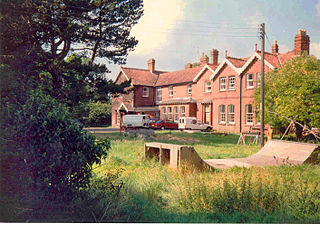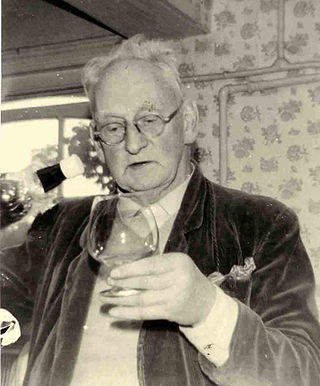
Summerhill School is an independent day and boarding school in Leiston, Suffolk, England. It was founded in 1921 by Alexander Sutherland Neill with the belief that the school should be made to fit the child, rather than the other way around. It is run as a democratic community and is considered a Democratic School; the running of the school is conducted in the school meetings, which anyone, staff or pupil, may attend, and at which everyone has an equal vote. These meetings serve as both a legislative and judicial body. Members of the community are free to do as they please, so long as their actions do not cause any harm to others, according to Neill's principle "Freedom, not Licence." This extends to the freedom for pupils to choose which lessons, if any, they attend. It is an example of both democratic education and alternative education.
An alternative school is an educational establishment with a curriculum and methods that are nontraditional. Such schools offer a wide range of philosophies and teaching methods; some have political, scholarly, or philosophical orientations, while others are more ad hoc assemblies of teachers and students dissatisfied with some aspect of mainstream or traditional education.
Alternative education encompasses educational philosophy differing from mainstream pedagogy and evidence-based education. Such alternative learning environments may be found within state, charter, and independent schools as well as home-based learning environments. Many educational alternatives emphasize small class sizes, close relationships between students and teachers and a sense of community.

Alexander Sutherland Neill was a Scottish educator and author known for his school, Summerhill, and its philosophy of freedom from adult coercion and community self-governance. Raised in Scotland, Neill taught at several schools before attending the University of Edinburgh in 1908–1912. He took two jobs in journalism before World War I, and taught at Gretna Green Village School in the second year of the war, writing his first book, A Dominie's Log (1915), as a diary of his life there as head teacher. He joined a Dresden school in 1921 and founded Summerhill on returning to England in 1924. Summerhill gained renown in the 1930s and then in the 1960s–1970s, due to progressive and counter-culture interest. Neill wrote 20 books. His top seller was the 1960 Summerhill, read widely in the free school movement from the 1960s.

Winter Springs High School, is a high school in Winter Springs, Florida. It was founded in 1997 as the seventh full-time high school in Seminole County. The school is operated by Seminole County Public Schools.
The Lehman Alternative Community School (LACS) is a public, alternative, combined middle and high school in the Ithaca City School District in Ithaca, New York. The school serves grades 6–12 with approximately 305 students.

Democratic education is a type of formal education that is organized democratically, so that students can manage their own learning and participate in the governance of their educational environment. Democratic education is often specifically emancipatory, with the students' voices being equal to the teachers'.

The Miccosukee Tribe of Indians is a federally recognized Native American tribe in the U.S. state of Florida. Together with the Seminole Nation of Oklahoma and the Seminole Tribe of Florida, it is one of three federally recognized Seminole entities. They are Indigenous peoples of the Southeastern Woodlands.
Seminole High School, originally established as Sanford High School, is a public high school located in Sanford, Florida, operated by Seminole County Public Schools. From 2006 to 2011, Seminole High School was one of the schools in Seminole County on Newsweek's list of the top 1,200 schools in the United States. The school offers the International Baccalaureate Diploma Programme. The Academy for Health Careers provides a curriculum based on a future career in health care. Students take a health class and health material is integrated into the curriculum of all other subjects. Seminole High also offers Advanced Placement courses in a range of subjects.

Crooms Academy of Information Technology, locally called Crooms, is a technology magnet school located in Sanford, Florida, known for being one of the few schools in the United States that issues laptops to every student. Crooms is much smaller than many U.S. high schools, having around 700 students. The school is operated by Seminole County Public Schools.

Lyman High School is a public high school located in Longwood, Florida. The school, founded in 1924, has been consistently ranked among the best in the state by the Florida Department of Education. For the 2012-2013 school term Lyman High School garnered a straight 'A' average, the best in the district, as a result of extremely high student scores on the Florida Comprehension Assessment Test. In 2014, it was ranked by U.S. News & World Report as the 27th best high school in the state of Florida and the overall best high school in Central Florida. It was ranked by Newsweek as the 204th best high school in the United States in 2010. The school was also named a Blue Ribbon School of Excellence in 1982. The school is operated by Seminole County Public Schools.
Spectrum Alternative School is an alternative education middle school of Toronto's Mount Pleasant west district that was established in 1978. Its original teachers included Ellen Dorfman, Brian Taylor, and David Clyne who all came from Deer Park Senior Public school in a program called Spectrum. It was the first alternative school for grade 7 and 8 students. The school was proposed in 1978 but was strongly opposed by the Toronto Area 6 superintendent. Due to intense parental lobbying of the TDSB the school was later created.
Summerhill is a neighborhood directly south of Downtown Atlanta between the Atlanta Zoo and Center Parc Stadium. It is bordered by the neighborhoods of Grant Park, Mechanicsville, and Peoplestown. Established in 1865, Summerhill is one of Atlanta’s oldest neighborhoods and part of the 26 neighborhoods making up the Atlanta Neighborhood Planning Unit system.

The Florida Department of Education (FLDOE) is the state education agency of Florida. It governs public education and manages funding and testing for local educational agencies. It is headquartered in the Turlington Building in Tallahassee.

A democratic school refers to an alternative school that meets the following criteria:

Yaacov Hecht , is an Israeli educator and worldwide pioneer of democratic education.
Maynard Evans High School is a high school located in Orlando, Florida, United States, served by Orange County Public Schools. The school's name is often shortened to "Evans High School" or "E-HIGH", and the mascot for the school are the Trojans.
Upattinas School and Resource Center was a private, non-profit school that served students in kindergarten through twelfth grade, as well as a homeschool resource center. Located in Glenmoore, Pennsylvania, Upattinas was a democratic school where everyone—staff, students, parents, and board—had the opportunity to participate in school governance.
The free school movement, also known as the new schools or alternative schools movement, was an American education reform movement during the 1960s and early 1970s that sought to change the aims of formal schooling through alternative, independent community schools.
The Free School is the oldest independent, inner-city alternative school in the United States. Founded by Mary Leue in 1969 based on the English Summerhill School philosophy, the free school lets students learn at their own pace. It has no grades, tests, or firm schedule: students design their own daily plans for learning. The school is self-governed through a weekly, democratic all-school meeting run by students in Robert's Rules. Students and staff alike receive one equal vote apiece. Unlike Summerhill-style schools, the Free School is a day school that serves predominantly working-class children. Nearly 80 percent of the school is eligible for reduced-price meals in the public schools. About 60 students between the ages of three and fourteen attend, and are staffed by six full-time teachers and a number of volunteers.









